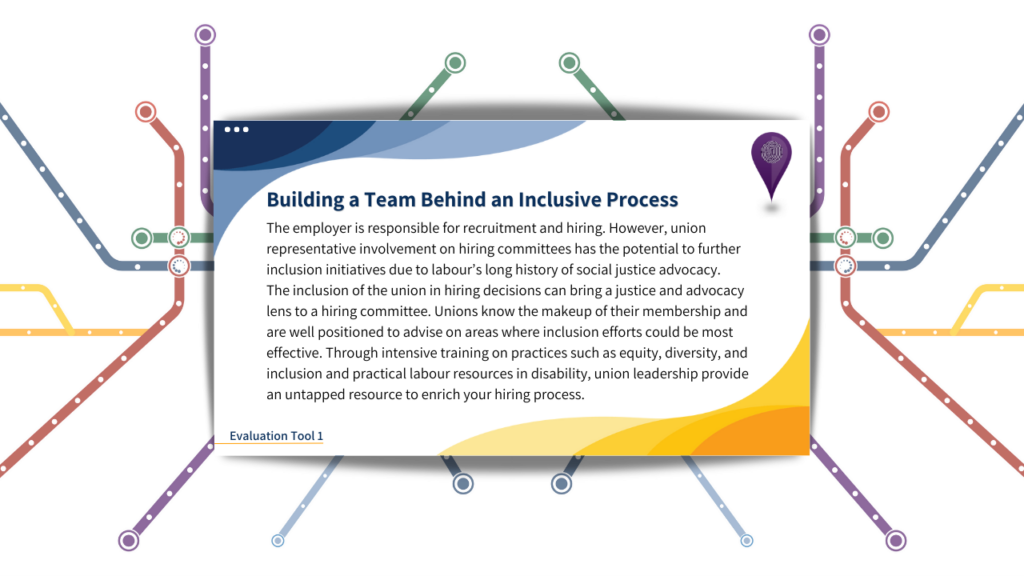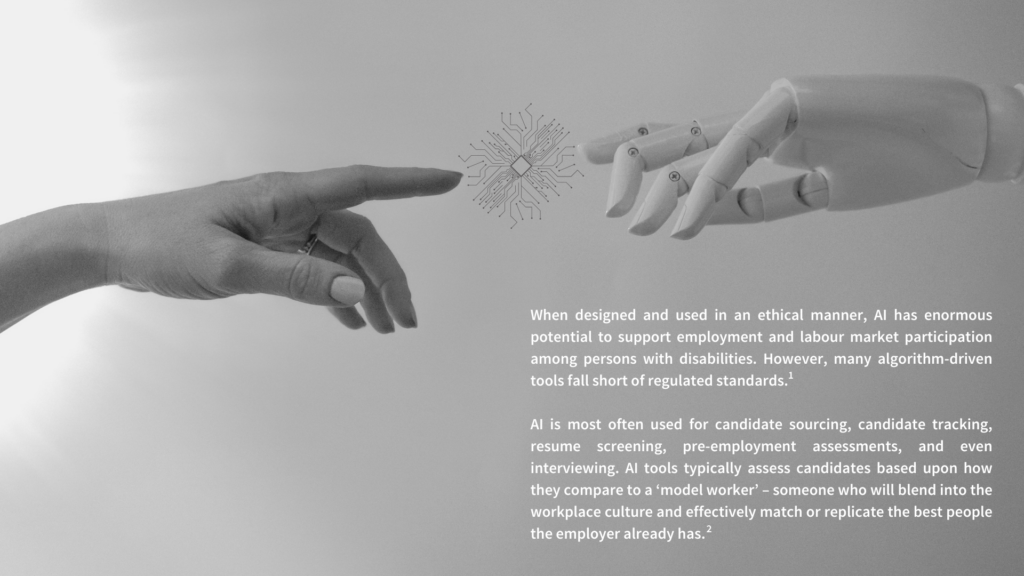Building A Team Behind an Inclusive Hiring Process
Disclaimer: This is a free resource created by community and is not for sale. All tools, contents and resources are not to be sold.
Who is this for?
High-Level Priority:
Hiring Managers
Hiring Committee Members
Practical Information:
Direct Line Managers
Useful to know:
DEI and HR Professionals
What guidance does it provide?
- How to appoint a diverse, equitable, and disability confident hiring committee
- How to prepare a hiring committee for an inclusive hiring process
Take home points
- Building a diverse team means including individuals of varying races, gender identity, age, ability, and more. To be inclusive of every candidate, it’s essential to design your hiring process with careful thought and consideration to ensure it is accessible to all candidates.
- When working to combat the structural inequities that persist in traditional hiring practices, it is essential that any potential committee member who identifies with underrepresented groups is not tokenized.
- Education, training, and ongoing dialogue are fundamental in shaping inclusive hiring committees that do not discriminate against people with disabilities. Stay informed and prepare collectively

Using Artificial Intelligence Powered Tools for Recruitment and Hiring
Who is this for?
High-Level Priority:
Information Technology Professionals
Artificial Intelligence Builders
Practical Information:
Recruiters
Hiring Managers
Hiring Committee Members
Useful to know:
DEI and HR Professionals
What guidance does it provide?
- Understanding the potential harms of using AI for screening applicants
- How to adjust AI tools to screen in candidates with disabilities and allow them to compete fairly on the basis of potential
Take home points
- Focus on the benefits, screen for, and eliminate potential for unintended consequences
- AI has the potential to tackle some of recruitment’s most intractable challenges, but only if the underlying algorithms and the data set powering them are trustworthy and free of bias. Biases often occur at the intersections of disability, race, gender, and other identities.
- Optimize for fairness by addressing barriers to develop a meaningful and robust audit of all algorithm-driven tools that may discriminate against persons with disabilities. This can assist to pinpoint and remove and human-introduced biases

Evaluating Candidates Throughout the Hiring Process
Who is this for?
High-Level Priority:
Hiring Managers
Hiring Committee Members
Practical Information:
Direct Line Managers
Useful to know:
DEI and HR Professionals
What guidance does it provide?
- How to use equitable approaches to evaluating resumes, interview performances, and other assessments
Take home points
- When evaluating candidates, be creative in your evaluation methods by focusing on attributes related to the job and bona fide occupational requirements (the must-haves)
- When approaching evaluation methods, ground the process in equity and, as much as possible, ensure candidates are asked the same the set of questions and evaluated based upon on the same criteria
- Understand that while consistency in the evaluation process is important to mitigate biases, to truly be equitable, you must modify the hiring and evaluation process if an applicant requests an accommodation
- Inquiring about past work history and lack of work experience can be uncomfortable, both for the employer and employee. Have an open conversation with a neutral tone to help engage in meaningful dialogue about candidates’ personal and professional development

Preparing for an Accessible Interview
Who is this for?
High-Level Priority:
Interviewers
Hiring Managers
Hiring Committee Members
Useful to know:
DEI and HR Professionals
What guidance does it provide?
- How to determine accommodation needs prior to an interview
- Understanding important accessibility considerations when planning in-person interviews
Take home points
- Inclusive interviewing involves designing an interview process that recognizes potential barriers and biases, and focuses on removing or mitigating the impact of these during the process
- This can include strategies such as stating that accommodations are available when inviting applicants to the interview, ensuring that interviews are held in an accessible space, and carefully composing a hiring committee with diverse and intersectional expertise to reduce individual bias
- Ensure that all accommodation requests from applicants are treated confidentially and respectfully
Conducting Accessible Phone and Virtual Interviews
Who is this for?
High-Level Priority:
Interviewers
Practical Information:
Hiring Managers
Hiring Committee Members
Useful to know:
DEI and HR Professionals
What guidance does it provide?
- How to plan for and conduct barrier-free phone and virtual interviews
Take home points
- Although phone and virtual interview are becoming the new norm, specific considerations still need to be addressed to ensure all applicants have an inclusive and accessible experience
- Keep in mind to be proactive and consistent in communication and scheduling, choosing the right technology to best accommodation applicants, and ensuring distractions and noise are limited
Conducting an Accessible Interview
Who is this for?
High-Level Priority:
Interviewers
Practical Information:
Hiring Managers
Hiring Committee Members
What guidance does it provide?
- How to use an accessible and inclusive approach to designing interview questions
- How to facilitate alternative assessments to an interview
- Understanding general tips and considerations for interviewing candidates with disabilities
Take home points
- When interviewing applicants with various lived experiences, it is important to be prepared and know the best etiquette and communication means to create an inclusive and accessible interview. Please check back on the ‘Best Practices’ table for more details
- Understanding the purpose of different interview questions can not only help assess the ideal qualifications you are searching but help refrain from asking closed-ended and typical questions. For example, one can ask, ‘what interests do you have that relate to this job’ instead of the common question ‘tell me about yourself?’
- Remember, standard interviews are not the only option. Participating in alternative interview options such as job fairs, mentorship programs, community referrals, and casual conversations can assist applicants with disabilities who do not disclose a disability in this process
Debriefing Evaluations and Collecting Feedback on the Hiring Process
Who is this for?
High-Level Priority:
Interviewers
Practical Information:
Hiring Managers
Hiring Committee Members
What guidance does it provide?
- How to use an accessible and inclusive approach to designing interview questions
- How to facilitate alternative assessments to an interview
- Understanding general tips and considerations for interviewing candidates with disabilities
Take home points
- When interviewing applicants with various lived experiences, it is important to be prepared and know the best etiquette and communication means to create an inclusive and accessible interview. Please check back on the ‘Best Practices’ table for more details
- Understanding the purpose of different interview questions can not only help assess the ideal qualifications you are searching but help refrain from asking closed-ended and typical questions. For example, one can ask, ‘what interests do you have that relate to this job’ instead of the common question ‘tell me about yourself?’
- Remember, standard interviews are not the only option. Participating in alternative interview options such as job fairs, mentorship programs, community referrals, and casual conversations can assist applicants with disabilities who do not disclose a disability in this process
